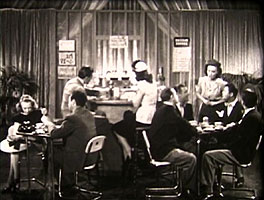 Four guys & a gal who make up The Glenn Miller Modernaires seat themselves in what looks like a living room, perhaps the living room of that one gal, who is Paula Kelly. We're entering the soundie Coffee & Rhythm (1946).
Four guys & a gal who make up The Glenn Miller Modernaires seat themselves in what looks like a living room, perhaps the living room of that one gal, who is Paula Kelly. We're entering the soundie Coffee & Rhythm (1946).
There's a palm tree in front of the closed drapes. It's a lame bit of staging, but worst, it's not even supposed to be a living room. It's supposed to be a corner of a diner, but looks not even distantly like one.
The five singers harmonize well enough but without personality: "If you wanna have fun, see everyone, go down to the diner/ Where the coffee is five, the donuts five, the coffee & donuts ten/ And the music they play make people say the music is finer/ Where the coffee is five, the donuts five, the coffee & dunuts ten."
The lyrics are just awful, & the tune not well enough interpretted to praise: "You! Can hear the coffee perkin'/ You! Can see the fried eggs workin'/ You! Might even find love lurkin'/ When you pass the sugar & the cream.
"Don't you worry if you need seats for two, there's room at athe diner/ Where the coffee is five, the donuts five, the coffee & donuts ten..."
The Modernaires stand & leave the room & then the camera jump-cuts to a larger view of the interior of the diner.
The four guys sit around a table & before even ordering are brought coffee. One of the guys sings a warning about how bad the pie is. Paula hovers over them as waitress & owner of the place. The number ends with the four guys placing tips in Paula's hand, though she hasn't really served them yet.
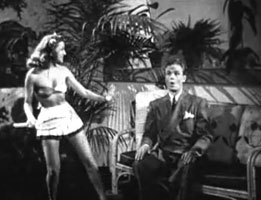 Vocalist Shelly Mitchell in skimpy tennis outfit & dandling a tennis racket instantly starts off the soundie Getting in Shape for Love (1944), singing the unimpressive lyrics:
Vocalist Shelly Mitchell in skimpy tennis outfit & dandling a tennis racket instantly starts off the soundie Getting in Shape for Love (1944), singing the unimpressive lyrics:
"I do my exercises this morning/ Wide awake at the crack of dawning/ Got no time for sighs or yawning/ Getting in shape for love."
She's singing to James Alexander, who sits courtside on a wicker bench, potted palms arrayed about. He looks totally startled by Shelly's eager come-on.
The double-entendre is that she's challenging him to tennis, but in all likelihood wants to bring him back to her room for some sexy roughhousing, hence Jimmie's look of surprise.
At the instrumental break a batch of mini-skirted babes arrive to do a chorus girl dance while swinging rackets at invisible balls. The blonde in the skimpiest silver outfit gets a solo dance, then it's back to Shelly singing & flirting at Jimmie.
James Alexander was an actor-singer who gets more to do in a couple other soundies, but for this one he just has to respond boyfriend-like to Shelly's performance. An entertaining if rather milquetoast soundie.
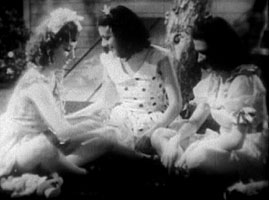 Billy MacDonald & His Highlanders made three soundies in 1944 including for the popular but certainly not timeless Playmates (1944) sung by two girls & a guy at first seen sitting on a bench in a garden. The song begins:
Billy MacDonald & His Highlanders made three soundies in 1944 including for the popular but certainly not timeless Playmates (1944) sung by two girls & a guy at first seen sitting on a bench in a garden. The song begins:
"Playmates. Come out & play with me/ And bring your dollies three/ Climb up my apple tree."
The trio stands up & hold hands in a line, calling up to the woman in the window who is shaking her head that she can't come out & be their playmate, because she has to take care of her infant, coddled in her arms, this being her "dolly" which has the flu. These adults acting like little children has an untended creepy edge to it, neither comical nor musically interesting.
We don't actually see the Highlanders, but in the backgroudn beyond the bench we can seean active playground. In jumpcuts through the instrumental break, we see three grown women sitting in their pinafores playing jacks, two more grown women playign jumprope, girls playing by the swings, falling off a tricycle.
A row of women with their heads in rain barrels are showing their undies to us the audience, a scene intended to inspire pedarastic fantasies no doubt. Why they've stuck their heads deep in rain barrels who can say. Another groukp of girls use a potato cellar door for a slide, beng very careful to spread their legs wide & show their undies.
A maypole scene is staged, & other antics in rapid success, until what seems like years has passed & the dreadful number is finished.
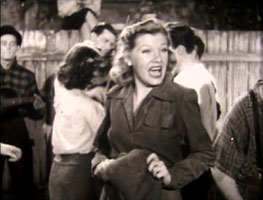 In The Kerry Dance (1942), Kay Lorraine & Merle Pitt's Five Shades of Blue are standing in front of an alley fence performing. Kay's low sexy voice is thrilling, saving even a so-so song choice.
In The Kerry Dance (1942), Kay Lorraine & Merle Pitt's Five Shades of Blue are standing in front of an alley fence performing. Kay's low sexy voice is thrilling, saving even a so-so song choice.
"Oh the days of the kerry dancing/ Oh the ring of the piper's tune/ Oh for one of those hours of gladness/ Go & dance like you used to do..."
It's apparently a poor Irish neighborhood. People start coming out of their houses & climbing over the fence for an impromptu alley party.
One crabby matronly broad shaking out her dust mop is annoyed by the noise & appears to be shouting at the band to knock it off, though none of her voice was recorded.
Many couples are dancing as the frumpy matron moves through the party angrily trying to get them to stop, & being ignored. But then at the instrumental break the band plays a jig, & the matron dances her jig like crazy. Eventually her husband comes outside to join in, & by then she's completely over being crabby about the party.
A pretty girl sits in a cover-girl pose improbably on the top ledge of the fence. More girls are on a fire escape watching. The stage is fairly elaborate as it really does look like an alleyway gathering.
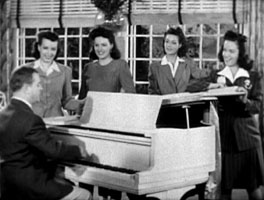 Gene Austin was one of America's very first "teen heart throb" recording artists, way back in the 1920s. His charm is a little hard to see in soundies filmed many long years later, but he did manage to sustain a lesser career for decades to follow, right up to his final appearances on television's Ed Sullivan Show in the 1950s.
Gene Austin was one of America's very first "teen heart throb" recording artists, way back in the 1920s. His charm is a little hard to see in soundies filmed many long years later, but he did manage to sustain a lesser career for decades to follow, right up to his final appearances on television's Ed Sullivan Show in the 1950s.
Gene is at a white piano in the middle of a stage dec ked out as a cafe setting. Unseen but on the soundtrack is Harry Brent & His Orchestra. Gene rap-sings an introduction to I Hear You Knocking (1942), then begins to sing, knocking on the wood of the piano between lines:
"I hear you knockin' but you can't come in/ I hear you knockin' but you can't come in/ I hear you you knockin' but you can't come in/ You stayed away too long.
"I get that feeling for you now & then/ I used to love you but I can't give in/ Stop your squawking cuz you're wrong again/ You stayed away too long.
"I'm bound to mention attention is something I go for/ Somebody else has been taking your place & doing so good so far.
"I hear you knocking but you can't come in/ I hear you knocking but you can't come in/ I used to love you but you can't come in/ You stayed away too long."
We see a happy couple at the bar knocking between lines, along with Gene. Four girls hover around the piano. A dance couple cuts a rug during the instrumental break; they're not showy but they're fairly decent jitterbuggers. We hear other instruments though there's only the piano seen.
Gene rap-talks to the camera then does some additional verses about his new lover who doesn't stay away too long, then wraps it up.
This is a decent jump-jazz song, & Gene Austin can't ruin it entirely, in fact he does it quite nicely though he's a hardly an exciting performer. He does bland it out a bit, much as Pat Boone blanded-out Little Richard numbers. The song was often recorded, including by the jump-jazz giant Louis Jordan & His Tympany Five in 1939. Many others recorded it in the '30s & '40s.
"I Hear You Knockin'" went through lots of transmutations & lyric variants even before it was transformed into a rock 'n' roll standard in the 1950s. Little Richard's "Keep A Knockin'" is all to often credited to Mike Stoller & Jerry Leiber, or more ambiguously to "Williams, Penniman, & Mays," the "Mays" being a particular puzzle. But it is just the same song with its alternate title, & the actual composer was Perry Bradford, about whom more momentarily. Little Richard made it a chart hit in 1957, #8 on the pop chart, #2 on the R & B chart.
Title & lyrics began shifting right from the start. Lil Johnson's 1935 version came under the title "Keep on Knocking" & Louis Jordan's version was "Keep a-Knockin'," each with variant but perfectly recognizable lyrics.
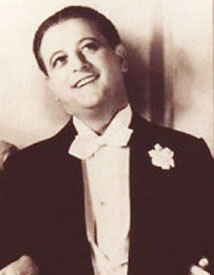 It underwent a fuller transformation with variant lyric & a bluesier beat when Dave Barthelemew & Pearl King took composition credit keeping the same title, "I Hear You Knocking." It underwent a fuller transformation with variant lyric & a bluesier beat when Dave Barthelemew & Pearl King took composition credit keeping the same title, "I Hear You Knocking."
The kleptoic Barthelmew/King revision would become the most-often covered from 1955 onward. For Smiley Lewis it was a #2 hit on the R & B chart, & #2 for Gale Storm on the pop chart, both in 1955. It was afterward a moderate hit for Fats Domino, & many others have covered it ever since.
So most people believe the song originated as a mid-50s rock number, or as two slightly different rock numbers from the '50s. Yet it was a hit for Gene Austin in 1935, & he performed it in the Mae West film Klondike Annie in 1936.
Before Gene turned it into a hit, it had already been recorded by Perry Bradford & his band, & by Lil Johnson. White performers were constantly looking to coopt black performers' work as their own, & in a segregated world, they reached different audiences. Unjustly the white performers got most of the cash for coopting if not outright stealing material.
The real composer of this great song was Perry Bradford. As a kid he had been a Chicago barrelhouse pianist (as early 1909) & so made it a great piece for piano performance. He was for decades popular on the "chitlin" circuit. Working the knuckled "knock knock knock" into the number was basically a vaudeville trick.
Bradford may well have been performing it on the chitlin circuit since the late 'teens, when he was working with a dance partner & could've "stomped" the "knocks" on the stage while dancing. The first reported recording of by Bob Call & James Wiggins in 1928; it was from Wiggins & Kokomo Arnold that Louis Jordan learned it.
copyright © by Paghat the Ratgirl
|
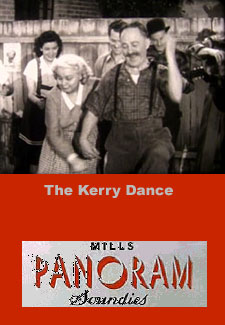





 It underwent a fuller transformation with variant lyric & a bluesier beat when Dave Barthelemew & Pearl King took composition credit keeping the same title, "I Hear You Knocking."
It underwent a fuller transformation with variant lyric & a bluesier beat when Dave Barthelemew & Pearl King took composition credit keeping the same title, "I Hear You Knocking."